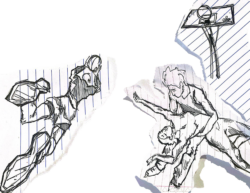We have an international crisis on our hands. Or, more precisely, on the left hand of French International soccer star Thierry Henry.
The controversy erupted on the most pressure packed of stages—extra time of the second game in an aggregate FIFA World Cup play-in series. The score was a level 1-1, as France and Ireland battled for a berth in the 2010 World Cup in South Africa. The stakes could not have been higher, as winner would go on to South Africa, and loser would go home with nothing but the hopes of qualifying in another four years.
In overtime, Henry blatantly corralled a ball with his hand near the Irish goal. After this obvious infraction, Henry flicked the ball across to his teammate, William Gallas, who easily deposited the ball into the net. It was apparent to everyone watching that a penalty was committed—well, everyone except the referee. Despite protests from Irish players and coaches, the ref was unwavering in allowing the goal. France was handed the game (pun intended), and Les Blues punched their ticket to South Africa. Ireland was left with nothing, wondering what had happened to their promising campaign.
There’s no denying the existence of a controversy, as even Henry admitted there was some foul play.
“I will be honest, it was a hand ball,” he said in a press conference after the game. “But I’m not the referee. I played it, the referee allowed it. That’s a question you should ask him.”
But Ireland has not surrendered quietly. Immediately after the game Irish players and officials called for FIFA, the governing body for soccer worldwide, to intervene. In the weeks following the game, Irish officials asked FIFA for a rematch in order to determine a proper winner without controversy. FIFA quickly denied this request. As this sermon goes to press, FIFA is mulling over Ireland’s next request to be let into the World Cup field as the 33rd team. All preliminary reports suggest that such a compromise would be impossible. Plain and simple, Ireland is screwed.
I am no stranger to officiating controversies. During this past MLB season, talk focused more on umpire blunders than the games themselves. The postseason and World Series hunt were marred by critical officiating mistakes that undermined the efforts of many teams, including my Detroit Tigers.
Am I claiming one season of MLB is comparable to a four-year campaign of the Irish national team in the most popular sport in the world? No. Nevertheless, important lessons can be taken from the way the Tigers responded to the officials who crushed their dreams.
When the Tigers were robbed of a run, they complained for a few seconds, then went on playing the game. Afterwards, the players acknowledged the importance of the call, but pointed out that the play was one of hundreds during the game that could have gone the other way. It is understandably hard to swallow a bad call, but Ireland had other chances during the game to achieve victory. While there was undeniably a crucial referee error, such mistakes are simply part of the game.
Many have impugned Henry’s character, claiming he should have told the referee not to count the goal. Some have said this ruins the significant reputation Henry has established during his distinguished international career. FIFA has gone so far as to have its disciplinary committee investigate Henry for his actions during the game. This must stop. The bottom line is that players play, officials officiate.
When I watch a soccer game on TV, all I see are players trying to trick the referee into calling non-existent fouls. Never do you see a player jump up from faking a broken ankle to tell the referee “I was just kidding! Please, give the other team the ball.” Henry’s legacy should not be tarnished any more than that of NBA players who flop or soccer players who fake injury to draw a call. It is the official’s job to determine when a penalty has been committed.
No one says Ireland should be happy about the missed call, but it’s part of the game. Better luck in four years.




